介词和数词
- 格式:doc
- 大小:348.00 KB
- 文档页数:9
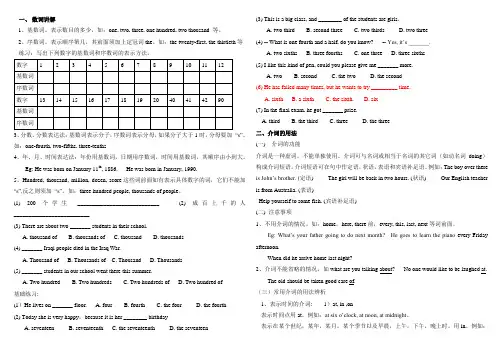
一、数词讲解1、基数词。
表示数目的多少,如:one, two, three, one hundred, two thousand 等。
2、序数词。
表示顺序第几,其前面须加上定冠词the。
如:the twenty-first, the thirtieth等练习:写出下列数字的基数词和序数词的表示方法。
3、分数。
分数表达法:基数词表示分子,序数词表示分母,如果分子大于1时,分母要加“s”。
如:one-fourth, two-fifths, three-tenths4、年、月、时间表达法:年份用基数词,日期用序数词,时间用基数词,其顺序由小到大。
Eg: He was born on January 11th, 1886. He was born in January, 1990.5、Hundred, thousand, million, dozen, score这些词前面如有表示具体数字的词,它们不能加“s”,反之则须加“s”。
如:three hundred people, thousands of people。
(1) 200 个学生____________________________ (2) 成百上千的人__________________________(3) There are about two _______ students in their school.A. thousand ofB. thousands ofC. thousandD. thousands(4) _______ Iraqi people died in the Iraq War.A. Thousand ofB. Thousands ofC. ThousandD. Thousands(5) _______ students in our school went there this summer.A. Two hundredB. Two hundredsC. Two hundreds ofD. Two hundred of基础练习:(1)He lives on _______ floor. A. four B. fourth C. the four D. the fourth(2) Today she is very happy,because it is her ________ birthdayA. seventeenB. seventeenthC. the seventeenthD. the seventeen (3) This is a big class, and ________ of the students are girls.A. two thirdB. second threeC. two thirdsD. two three(4) -- What is one fourth and a half, do you know? -- Yes, it’s _______.A. two sixthsB. three fourthsC. one threeD. three sixths(5) I like this kind of pen, could you please give me _______ more.A. twoB. secondC. the twoD. the second(6) He has failed many times, but he wants to try _________ time.A. sixthB. a sixthC. the sixthD. six(7) In the final exam, he got _______ prize.A. thirdB. the thirdC. threeD. the three二、介词的用法(一) 介词的功能介词是一种虚词,不能单独使用。

数词1. 定义:表示"多少"和"第几"的词,叫数词。
其用法相当于名词或者形容词。
数词分为基数词和序数词两种。
基数词: 表示数目的词是基数词,最基本的数词如下:1 one,2 two,3 three,4 four,5 five,6 six,7 seven,8 eight,9 nine, 10 ten, 11 eleven, 12 twelve, 13 thirteen, 14 fourteen, 15 fifteen, 16 sixteen, 17 seventeen,18 eighteen, 19 nineteen, 20 twenty, 30 thirty, 40 forty, 50 fifty, 60 sixty,70 seventy, 80 eighty, 90 ninety,100 a hundred,1,000 a thousand, 1,000,000 a million,1,000,000,000 a billion.基数词1-12 是独立单词,需逐个记忆。
基数词13 - 19是个位数词的词干后加-teen 构成。
其中thirteen, fifteen, eighteen, 变化不规则。
基数词20 ━90 是在十位数词后面加-ty 构成。
基数词21 ━ 99 是在十位数词后面加上个位数词合成,中间加上连字符" ━ " 。
例如:21 twenty ━ one 95 ninety ━ five基数词三位以上的数词, 在百位和十位之间,一般要用连词"and "。
例如:132 one hundred and thirty ━ two.1340 one thousand three hundred and forty表示"万"的词英语中没有.如1万可用10千来表示。
ten thousand. 30万可用three hundred thousand 来表示。
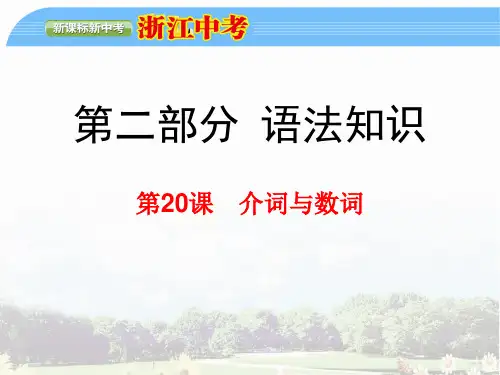
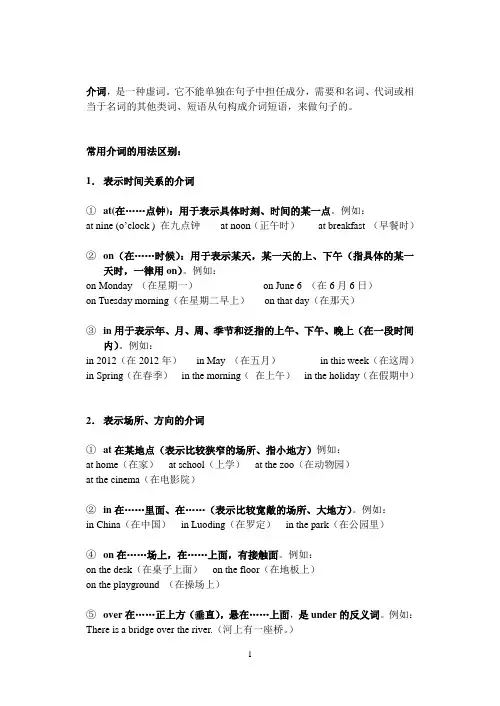
介词,是一种虚词。
它不能单独在句子中担任成分,需要和名词、代词或相当于名词的其他类词、短语从句构成介词短语,来做句子的。
常用介词的用法区别:1.表示时间关系的介词①at(在……点钟):用于表示具体时刻、时间的某一点。
例如:at nine (o’clock ) 在九点钟at noon(正午时)at breakfast (早餐时)②on(在……时候):用于表示某天,某一天的上、下午(指具体的某一天时,一律用on)。
例如:on Monday (在星期一)on June 6 (在6月6日)on Tuesday morning(在星期二早上)on that day(在那天)③in用于表示年、月、周、季节和泛指的上午、下午、晚上(在一段时间内)。
例如:in 2012(在2012年)in May (在五月)in this week(在这周)in Spring(在春季)in the morning(在上午)in the holiday(在假期中)2.表示场所、方向的介词①at在某地点(表示比较狭窄的场所、指小地方)例如:at home(在家)at school(上学)at the zoo(在动物园)at the cinema(在电影院)②in在……里面、在……(表示比较宽敞的场所、大地方)。
例如:in China(在中国)in Luoding(在罗定)in the park(在公园里)④on在……场上,在……上面,有接触面。
例如:on the desk(在桌子上面)on the floor(在地板上)on the playground (在操场上)⑤over在……正上方(垂直),悬在……上面,是under的反义词。
例如:There is a bridge over the river.(河上有一座桥。
)冠词、数词冠词要用在名词前面,用来说明名词所指的人或事物是泛指还是特指。
冠词是一种虚词,不能单独作句子成分。
冠词分为不定冠词a/an和定冠词the。
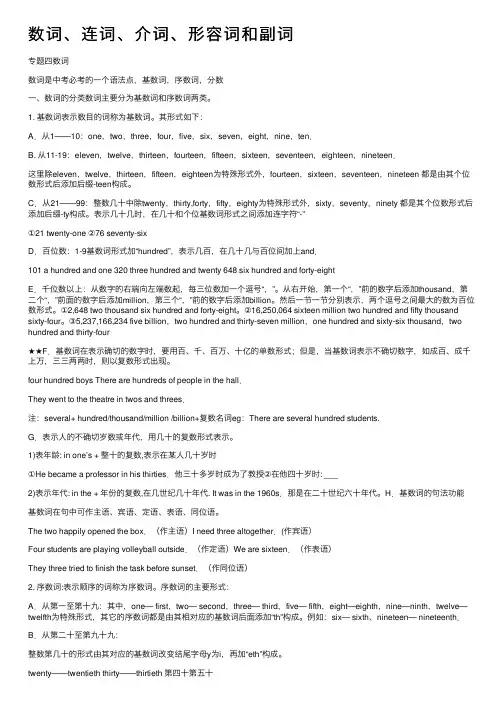
数词、连词、介词、形容词和副词专题四数词数词是中考必考的⼀个语法点,基数词,序数词,分数⼀、数词的分类数词主要分为基数词和序数词两类。
1. 基数词表⽰数⽬的词称为基数词。
其形式如下:A.从1——10:one,two,three,four,five,six,seven,eight,nine,ten.B. 从11-19:eleven,twelve,thirteen,fourteen,fifteen,sixteen,seventeen,eighteen,nineteen.这⾥除eleven,twelve,thirteen,fifteen,eighteen为特殊形式外,fourteen,sixteen,seventeen,nineteen 都是由其个位数形式后添加后缀-teen构成。
C.从21——99:整数⼏⼗中除twenty,thirty,forty,fifty,eighty为特殊形式外,sixty,seventy,ninety 都是其个位数形式后添加后缀-ty构成。
表⽰⼏⼗⼏时,在⼏⼗和个位基数词形式之间添加连字符“-”①21 twenty-one ②76 seventy-sixD.百位数:1-9基数词形式加“hundred”,表⽰⼏百,在⼏⼗⼏与百位间加上and.101 a hundred and one 320 three hundred and twenty 648 six hundred and forty-eightE.千位数以上:从数字的右端向左端数起,每三位数加⼀个逗号“,”。
从右开始,第⼀个“,”前的数字后添加thousand,第⼆个“,”前⾯的数字后添加million,第三个“,”前的数字后添加billion。
然后⼀节⼀节分别表⽰,两个逗号之间最⼤的数为百位数形式。
①2,648 two thousand six hundred and forty-eight。
②16,250,064 sixteen million two hundred and fifty thousand sixty-four。

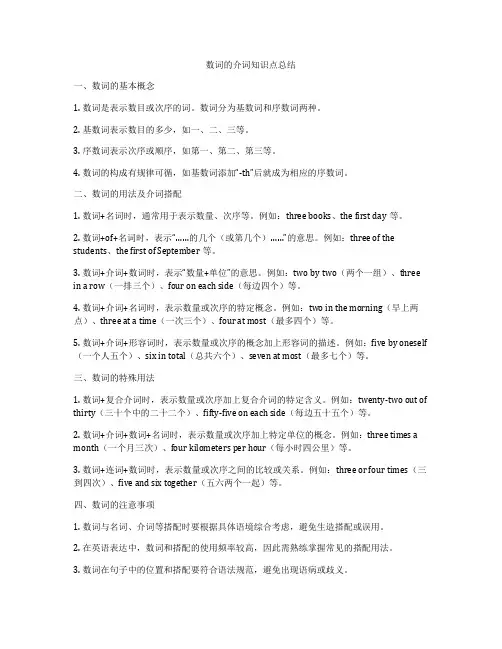
数词的介词知识点总结一、数词的基本概念1. 数词是表示数目或次序的词。
数词分为基数词和序数词两种。
2. 基数词表示数目的多少,如一、二、三等。
3. 序数词表示次序或顺序,如第一、第二、第三等。
4. 数词的构成有规律可循,如基数词添加“-th”后就成为相应的序数词。
二、数词的用法及介词搭配1. 数词+名词时,通常用于表示数量、次序等。
例如:three books、the first day等。
2. 数词+of+名词时,表示“……的几个(或第几个)……”的意思。
例如:three of the students、the first of September等。
3. 数词+介词+数词时,表示“数量+单位”的意思。
例如:two by two(两个一组)、three in a row(一排三个)、four on each side(每边四个)等。
4. 数词+介词+名词时,表示数量或次序的特定概念。
例如:two in the morning(早上两点)、three at a time(一次三个)、four at most(最多四个)等。
5. 数词+介词+形容词时,表示数量或次序的概念加上形容词的描述。
例如:five by oneself (一个人五个)、six in total(总共六个)、seven at most(最多七个)等。
三、数词的特殊用法1. 数词+复合介词时,表示数量或次序加上复合介词的特定含义。
例如:twenty-two out of thirty(三十个中的二十二个)、fifty-five on each side(每边五十五个)等。
2. 数词+介词+数词+名词时,表示数量或次序加上特定单位的概念。
例如:three times a month(一个月三次)、four kilometers per hour(每小时四公里)等。
3. 数词+连词+数词时,表示数量或次序之间的比较或关系。
例如:three or four times(三到四次)、five and six together(五六两个一起)等。
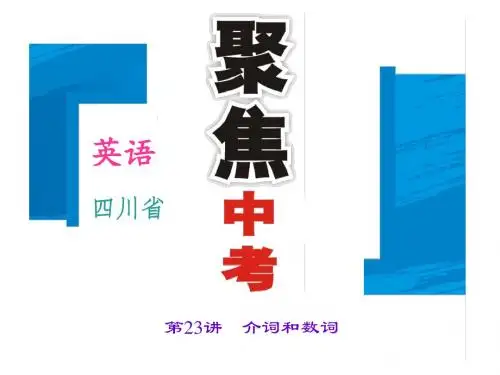
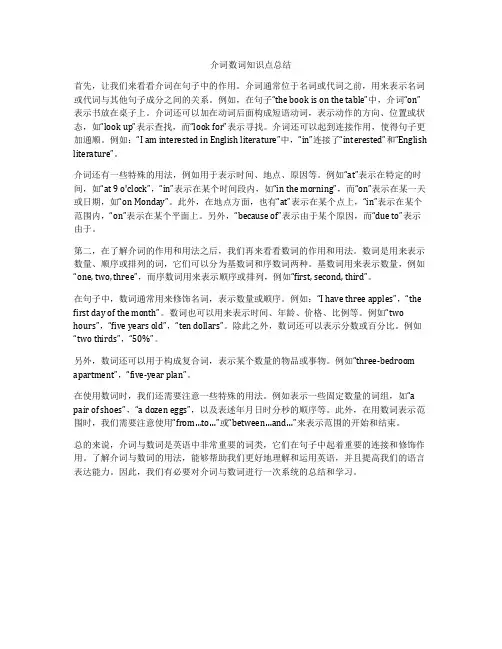
介词数词知识点总结首先,让我们来看看介词在句子中的作用。
介词通常位于名词或代词之前,用来表示名词或代词与其他句子成分之间的关系。
例如,在句子“the book is on the table”中,介词“on”表示书放在桌子上。
介词还可以加在动词后面构成短语动词,表示动作的方向、位置或状态,如“look up”表示查找,而“look for”表示寻找。
介词还可以起到连接作用,使得句子更加通顺。
例如:“I am interested in English literature”中,“in”连接了“interested”和“English literature”。
介词还有一些特殊的用法,例如用于表示时间、地点、原因等。
例如“at”表示在特定的时间,如“at 9 o'clock”,“in”表示在某个时间段内,如“in the morning”,而“on”表示在某一天或日期,如“on Monday”。
此外,在地点方面,也有“at”表示在某个点上,“in”表示在某个范围内,“on”表示在某个平面上。
另外,“because of”表示由于某个原因,而“due to”表示由于。
第二,在了解介词的作用和用法之后,我们再来看看数词的作用和用法。
数词是用来表示数量、顺序或排列的词,它们可以分为基数词和序数词两种。
基数词用来表示数量,例如“one, two, three”,而序数词用来表示顺序或排列,例如“first, second, third”。
在句子中,数词通常用来修饰名词,表示数量或顺序。
例如:“I have three apples”,“the first day of the month”。
数词也可以用来表示时间、年龄、价格、比例等。
例如“two hours”,“five years old”,“ten dollars”。
除此之外,数词还可以表示分数或百分比。
例如“two thirds”,“50%”。
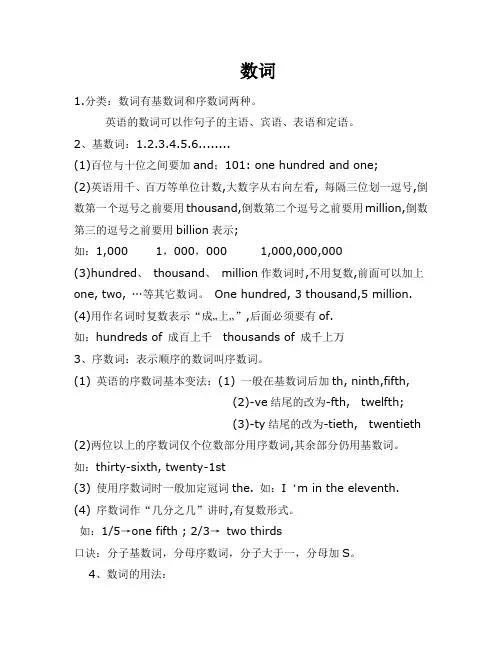
数词1.分类:数词有基数词和序数词两种。
英语的数词可以作句子的主语、宾语、表语和定语。
2、基数词:1.2.3.4.5.6........(1)百位与十位之间要加and;101: one hundred and one;(2)英语用千、百万等单位计数,大数字从右向左看, 每隔三位划一逗号,倒数第一个逗号之前要用thousand,倒数第二个逗号之前要用million,倒数第三的逗号之前要用billion表示;如:1,000 1,000,000 1,000,000,000(3)hundred、thousand、million作数词时,不用复数,前面可以加上one, two, …等其它数词。
One hundred, 3 thousand,5 million.(4)用作名词时复数表示“成…上…”,后面必须要有of.如:hundreds of 成百上千thousands of 成千上万3、序数词:表示顺序的数词叫序数词。
(1) 英语的序数词基本变法:(1) 一般在基数词后加th, ninth,fifth,(2)-ve结尾的改为-fth, twelfth;(3)-ty结尾的改为-tieth, twentieth (2)两位以上的序数词仅个位数部分用序数词,其余部分仍用基数词。
如:thirty-sixth, twenty-1st(3) 使用序数词时一般加定冠词the. 如:I‘m in the eleventh.(4) 序数词作“几分之几”讲时,有复数形式。
如:1/5→one fifth ; 2/3→two thirds口诀:分子基数词,分母序数词,分子大于一,分母加S。
4、数词的用法:(1)表示年份:2002: twenty thousand and two(2)表示日期:2002年11月8日: Nov. 8th, 2002.(3)表示时刻:5:15→five fifteen(4)表示编号:Room 105→Room one 0 five;5、小数的读法:5.7→five point seven, 0.16 →zero point one six.6、“半”的表达:1/2→half, 半小时→half an hour,当堂训练:完成下列句子。
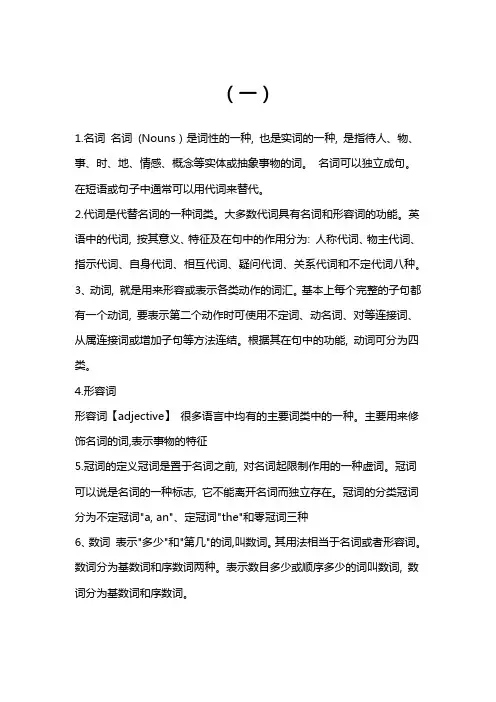
(一)1.名词名词(Nouns)是词性的一种, 也是实词的一种, 是指待人、物、事、时、地、情感、概念等实体或抽象事物的词。
名词可以独立成句。
在短语或句子中通常可以用代词来替代。
2.代词是代替名词的一种词类。
大多数代词具有名词和形容词的功能。
英语中的代词, 按其意义、特征及在句中的作用分为: 人称代词、物主代词、指示代词、自身代词、相互代词、疑问代词、关系代词和不定代词八种。
3、动词, 就是用来形容或表示各类动作的词汇。
基本上每个完整的子句都有一个动词, 要表示第二个动作时可使用不定词、动名词、对等连接词、从属连接词或增加子句等方法连结。
根据其在句中的功能, 动词可分为四类。
4.形容词形容词【adjective】很多语言中均有的主要词类中的一种。
主要用来修饰名词的词,表示事物的特征5.冠词的定义冠词是置于名词之前, 对名词起限制作用的一种虚词。
冠词可以说是名词的一种标志, 它不能离开名词而独立存在。
冠词的分类冠词分为不定冠词"a, an"、定冠词"the"和零冠词三种6、数词表示"多少"和"第几"的词,叫数词。
其用法相当于名词或者形容词。
数词分为基数词和序数词两种。
表示数目多少或顺序多少的词叫数词, 数词分为基数词和序数词。
7、副词(Adverb)副词的定义: 副词是一种用来修饰动词,形容词,副词或全句的词,说明时间,地点,程度,方式等概念。
8、介词的定义和特征介词是一种用来表示词与词, 词与句之间的关系的词。
在句中不能单独作句字成分。
介词后面一般有名词代词或相当于名词的其他词类, 短语或从句作它的宾语。
(二)1.名词, 人或事物的名称3.代词, 代替名词或者数词(比如some就是代替数目)3.动词, 动作或状态4.数词, 表示数目或顺序(比如序数词, 5th就是表示顺序)5.形容词, 人或事物的性质或状态(因为形容词一般修饰名词)6.副词, 动作的特征或性状特征(因为副词一般修饰动词或形容词)7、冠词, 表示名词的泛指或特指8、介词, 表示名词或代词与其他词的关系(因为介词后面一半紧跟名词, 代词或其他名词性结构)9、连词, 连接词与词, 短语与短语, 句子与句子10、感叹词, 表示说话时的感情或语气(三)1.adj./ a.形容词用来描述一类物质的性质,状态,外貌,或人的性格特点,性质,品格如:big,happy2.adv./ ad.副词用来修饰动作或形容词,一般在句子中做状语用表示动作的进行怎样,或表示程度,特点,如:clearly,happily3.prep.介词连接地点,时间的一类词语,可以表示方位,时间.跟一些表示时间,地点的词连用表示介词词组如:in,to,on,under4.conj.连词用来连接时间,地点,原因,结果的一类词语如:when,beacuse,so5.num.数词表示数字的词,既可以是基数词,也可以是序数词如:one,two,first6.int.感叹词表示感叹的一类词,一般不加一解释,只代表感叹如:what,how,haurray7、vt.及物动词(后面要加宾语)行为动作的词如:do,finish,play8、vi.不及物动词(后面不加宾语)表示行为动作的词如:appear9、n.名词表示物体,物质的词如:pig,cow,man10、pron.代词代指一类人,事或物的词如:he,she,hers,his,things11.art = 冠词, article的缩写(四)在英语语法中主要把词分为8大类:1. 名词: 表示人、物或地方等, 如: John, teacher;table, pen;London;beauty.2. 代词: 用来代替名词, 以避免重复某个名词, 如: I, you, it, that, those, them.3.形容词:用来修饰或限制某个(些)名词, 如:good(man), white (paper), every(book), much(water), (John is)hon-est, (He seems)lazy.被修饰或限制的名词, 叫做主体词(head-word)。
第三课时 介词和数词介词是历年中考的必考点,介词的考查主要集中在基本用法和习惯搭配上。
常见考点如下:①介词辨析①介词的固定搭配(“动词+介词”; “形容词+介词”;“介词+a/an/the/his/Jim’s +名词”)考点一 表示时间的介词1.at 多用于具体钟点前,如:at seven,at a quarter to one;也可用于固定搭配中,如:at noon,at night 。
2.in 表示一段时间,用于年、月、世纪、四季或泛指的一天的上午、下午、晚上等前。
如:in the twenty -first century 在21世纪,in autumn 在秋天,in the morning 在早上;还可用于表示“从现在起,多长时间以后或多久之后”的短语中。
3.on 主要用在星期几、具体某一天或具体某一天的早、中、晚或节日前。
如:on the Mid -Autumn Festival 在中秋节on June 1st 在6月1日4.since,from 和for 介词 含义及用法例句since指从某时一直延续至今,后常接时间点,句子用完成时。
He has lived here since 1993.从1993年开始他一直住在这里。
from说明开始时间,可用过去、现在、将来的某种时态。
From now on,I will learn English every morning.从今以后,每天早晨我将学英语。
for指动作延续贯穿整个过程,后接时间段,句子用完成时。
I have studied English for six years.我已经学英语六年了。
题组训练用适当的介词填空①Mother’s Day is the second Sunday in May.①We usually get to school 7:40 in the morning.①Her birthday is winter, the most beautiful season in a year.①Uncle Wang has worked in the factory twenty years.①—How soon will he come back?— a month.考点二表示方位的介词1.表示方位的in,on和toin表示在某一地区之内(属于该范围);on表示与某地的毗邻关系;to表示在某一地区之外(不属于该范围)。
高考综合复习:数词与介词审稿:白雪雁责编:张敏数词考点透析hundred,thousand,million,billion 表示确切的数目时;不能加s,如:two hundred students,如果表示不确切的数目,则在后加s,并与of连用。
如:hundreds of teachers,thousands of farmers,millions of stars。
scores of与dozens of都表示概数,意为“数十,许多”,a score eggs(二十个鸡蛋)、a dozen eggs(十二个/一打鸡蛋)都是成立的,但可以说a score of eggs,不能说a dozen of eggs。
年代的表示法有两种:二十世纪八十年代可写成in the 1980s或in the 1980s'。
“基数词+名词”构成的定语,其中的名词用单数。
如:a three—month baby,an 800—word composition序数词前如有the,表顺序。
如:the Second World War,the first question 如果序数词前有不定冠词a,则表示“再,又”。
如:I've failed six times,but I decided to have a seventh try.常见的含数词的短语:in twos and threes 三三两两one or two days 没几天;一二天first of all 首先second to none 首屈一指,不亚于任何人one by one 一个一个地ten to one 十之八九one in ten 十分之一fifty fifty 对半数词强化训练选择题1. Americans eat ______ vegetables per person today as they did in 1910.A.more than twice B.as twice as manyC.twice as many as D.more than twice as many2. In that year the great woman received ______ second Noble Prize ______ physics.A.a,for B.a,inC.the,on D.the,for3. There are ______ these books and ______ pencils in this small shop.A.a dozen,scores of B.scores,a dozen ofC.scores of,a dozen D.two dozens,a score4. Great changes have taken place ______.A.in the 1990's B.in 1990'sC.on the 1990s D.on 19905. Believe it or not,my grandma began to learn computer ______.A.at her seventeen B.in her seventiesC.in her seventieth D.at her seventies6. About three ______ took part in the demonstration against the war on Iraq.A.thousand people B.thousands peopleC.thousands of people D.thousands peoples7. It is reported that only ______ of the American people think that the war is going onsuccessfully.A.three—tenths B.third—tenthC.three—tenth D.three—tens8. The rice production has increased by ______ percent this year.A.five point eight six B.five—point—eight—sixC.five point eight sixth D.five points eight sixth9. —How many presidents before Abraham Lincoln?—______,so he was ______ president.A.Fifteen,the sixteenth B.Fifteen,sixteenthC.Fifteen,sixteen D.Fifteenth,the sixteen10. It will take me ______ time to finish the course.A.one and a half years B.a year and fl halfC.one and fl half years' D.one and a half year's11. Is the Yellow River ______ river in China?A.a second large B.the second largestC.the second large D.a second largest12. ______ of the text are rather difficult for us beginners.A.The first three parts B.First three partC.The one—third part D.The third first part13. —How long will you stay there?—For ______.A.one and two days B.one and two dayC.one or two day D.a day or two14. Many scientists believe that oil was formed in the earth ______ years ago.A.million B.millions ofC.millions D.million of15. —What can I do for you?—I'd like to take ______ these tomatoes.A.two dozen of B.two dozenC.two dozens D.two dozens of16. The found a ______ cave near the mountain.A.three-metres-deep B.three metres deepC.three-metre-deep D.three metre deep17. He lived in ______ on ______ floor.A.the 506 room,the fifthB.Room 506,the fifthC.a Room 506,a fifthD.Room 506,fl fifth18. ______ who will take part in the beauty competition are university students.A.Twenty percent of the girlsB.Twenty percents of girlsC.Twentieth percent of the girlsD.Twenty percent girls19. Jack's salary is 3,000 dollars a month,which is ______ John's.A.two times more than B.twice moreC.twice the amount of D.twice as much than20. The class was over.The students went out of the classroom by ______.A.two or three B.twos and threesC.three or two D.twos or threes。
初中英语词汇知识讲解:介词、形容词、副词、数词、冠词初中英语词汇知识讲解:介词、形容词、副词、数词、冠词介词表示时间的介词及介词短语?at, on, before,after,till,since,until, by,ddle of,at the beginning of, ad of,at half past five,at night,in a week,g,in class,at sunrise,g/summer/autumn/winter,on Sunday,on Saturday a,on a winter evening,for a long time,for tw,al,since liberation,before lunch,a,at the age of。
6.2 表示地点的介词及介词短语?in,at,into,to,on,beside,before,behind,above,under,outside,inside,uaar,across, off,down, among, past,between,out of,around,,ddle of, at the back of,a,at home,at the gate,at the table,,ground,in a tree,uth,un,in the bed,on one’s way home,bde of。
形容词、副词形容词、副词形容词的位置(1)形容词作定语一般要放在名词前面,但当形容词修饰不定代词g,nothing,anything时要放在所修饰的不定代词之后。
如:g important,nothing serious。
(2)当形容词带有表示度量的词或词组作定语或表语时,定语或表语要后置。
如:We have dug a hole twdThe hole is about twd2 形容词的比较等级(1) 单音节词和少数双音节词,在词尾加—(e)r,—(e)st来构成比较级和最高级。
第24讲介词和数词介词【真题体验】1.Nanjing Lishui Strawberry Festival opened __C__ March in Fujiabian Modern Agricultural Park this year.(2014,南京)A.on B.at C.in D.to2.I sometimes help my mom with her housework __C__ Saturdays.(2014,北京)A.at B.in C.on D.to3.A ship from South Korea sank into the sea __B__ April 16,2014.(2014,滨州)A.in B.on C.at D.for4.Some workers in that factory have to work __A__ night.(2014,嘉兴)A.at B.for C.with D.among【考点梳理】中考对介词的考查主要是介词的基本用法和介词的辨析。
学习重点应放在以下三点:1.表时间、地点、方式等介词的用法;2.介词短语及介词与其他词的搭配使用;3.同义或近义介词辨析。
高频考向一表时间的介词1.at,in,on表示时间点用at,如:at six o'clock,at noon,at midnight。
表示在某个世纪、某年、某月、某个季节以及早晨、上午、下午、晚上时用in,如:in May,in winter,in the morning,in the afternoon等。
表示具体的某一天和某一天的上午、下午、晚上时用on,如:on Monday,on July 1st,on Sunday morning等。
2.since,after由since和after引导的词组都可表示从过去某一点开始的时段,但since词组表示的时段一直延续到说话的时刻,因而往往要与现在完成时连用。
而after词组所表示的时段为过去,因而要与一般过去时连用。
如:They have lived here since 1978.自从1978年起,他们就住在这儿。
After five days the boy came back.五天后这个男孩回来了。
3.in,afterin与将来时态连用时,表示“过多长时间以后”的意思,后面跟表示一段时间的词语。
对此提问用How soon。
after与将来时态连用时,后面只能跟表示时间点的词语。
after与过去时态连用时,后面才能跟表示一段时间的词语。
如:He will be back in two months.他将在两个月后回来。
He returned after a month.他一个月后回来了。
4.for,sincefor可以指过去、现在或将来,着重说明“多久”,后面接时间段。
since意为“自从……起”,多与完成时连用,后面接时间点或从句。
since引导的从句通常为一般过去时。
且两者作介词所描述的动作都是持续性动作,since引导从句时,主句的动作是持续性的。
如:He has lived here for two weeks.他在这儿住了两个星期了。
He has lived here since two weeks ago.他两周前就住这儿了。
It's five years since he left school.他毕业五年了。
【例1】—What time do you usually go to school,Jack?—________ about half past seven.(2014,重庆B)A.On B.In C.At D.For点拨:表示具体的时间点用at。
答案:__C__【例2】It is believed that ________ December 21,1891,the first basketball game in history was played.(2014,菏泽)A.on B.in C.at D.by点拨:表示具体的某一天用on。
答案:__A__【例3】—How long have you lived in the new flat?—________ 2010.(2013,扬州)A.In B.After C.Since D.Before点拨:表示“自从……起”应用介词since,后常接时间点或从句。
答案:__C__高频考向二表示地点和位置的介词1.at,in,onat一般指小地方;in一般指大地方或某个范围之内;on往往表示“在某个物体的表面”。
如:He arrived in Shanghai yesterday.昨天他到达上海。
They arrived at a small village before dark.天黑前,他们到达了一个小村子。
The teacher put up a picture on the wall.这个老师在墙上贴了一张画。
2.over,above,onover,on和above都可表示“在……上面”,但具体含义不同。
over表示位置高于某物,在某物的正上方,其反义词是under。
above也表示位置高于某物,但不一定在正上方,其反义词是below。
on指两个物体表面接触,一个在另一个的上面。
如:There is a bridge over the river.河上有座桥。
We flew above the clouds.我们在云层上飞行。
They put some flowers on the teachers' desk.他们放了一些花在老师桌子上。
3.in,on,to从下图可以看出in表示“在某一范围之内,在……中”;on表示两个不同的个体相邻或接壤,即“毗邻;接壤”;to则表示两个个体之间有一段距离。
如:Japan lies to the east of China in the east of Asia.It faces the Pacific on the east.日本在亚洲东部(范围内),中国东面(不接壤),东临太平洋(接壤)。
4.in front of,in the front ofin front of表示“在某人或某物的前面”,在某个范围以外;in the front of表示“在……的前部”,在某个范围以内。
如:There are some tall trees in front of the building.这栋大楼前有一些高树。
The teacher is sitting in the front of the classroom.老师坐在教室前面。
5.across,throughacross表示从物体表面通过,与on有关。
through表示穿过一个空间,与in有关。
如:The boy ran across the street.这个男孩跑过了街。
They walked through the forest.他们穿过了森林。
6.below,underbelow “在……下”,不一定在正下方。
under “在……正下方”。
如:There is a dog under the desk.书桌下有一只小狗。
Write your name below the line.在横线下方写下你的名字。
7.between,amongbetween指两者之间。
among指三者或三者以上的人或事物之间。
如:There is a map between the door and the window.门和窗户之间有一张地图。
He is sitting among the students.他坐在学生当中。
【例4】—When and where were you born?—I was born ________ October 1st,1998 ________ Nanjing.(2014,玉林,防城港)A.on;on B.in;in C.on;in D.in;on点拨:表示具体某一天用介词on;表示“在南京”用介词in。
答案:__C__【例5】Mrs.King put a coat ________ the sleeping girl to keep her warm.(2013,安徽) A.over B.with C.behind D.beside点拨:由语境可知句意为“金太太把一件大衣盖在那个睡觉的小女孩身上来为她保暖”。
答案:__A__【例6】—Did you go to Kenli during the Peach Blossom Festival(桃花节)?—Yes.The flowers were beautiful.Bees were flying ________ them.(2013,东营)A.in B.among C.between D.through点拨:由语境可知句意为“是的,那些花很漂亮。
蜜蜂在它们中间飞来飞去”。
答案:__B__高频考向三表示方式的介词by,with,in,onby表示“以……方式、方法或手段”;with表示“用……工具”;in表示“用……方式、语言、语调或颜色”等;on则一般指用网络、电脑、电视、电话等。
如:He studies English by reading aloud every day.他通过每天大声朗读学英语。
How amazing!The boy can write with his two hands at the same time.真神奇,这个男孩能用左右手同时写字。
Can you spell it in English?你会用英语把它拼出来吗?【例7】You see,Kevin is writing ________ his left hand.(2014,河北)A.at B.as C.for D.with点拨:句意为“你瞧,凯文正在用左手写字”。
答案:__D__【例8】When I got into the room,Sue was talking ________ the phone.A.with B.on C.to D.in点拨:用电话在交谈,介词应用on。
答案:__B__高频考向四介词的固定搭配介词往往同其他词类形成了固定搭配关系。
熟记并掌握这种固定搭配关系,才能正确使用介词。
1.动词+介词arrive in/at到达ask for请求do well in在……方面做得好give up放弃prefer…to…宁愿选择……,更喜欢……regard…as…把……看做……thanks to幸亏,由于think about考虑try on试穿(衣服,鞋等)laugh at嘲笑learn from向……学习2.介词+名词in time 及时on time 准时in front of 在……前面at home 在家in English 用英语at night 在晚上with a smile 带着微笑at first 首先at last 最后on one's way to 在某人去……的路上at the same time 同时by hand 用手,手工,亲手3.介词与形容词、过去分词和动词等搭配be born in…出生于……be good at…擅长……be made of…由……制成be angry with sb.生某人的气be angry at sth.为某事生气be surprised at对……感到惊奇(诧异)be used to doing…习惯于干……be tired of…讨厌……;厌倦……be interested in对……感兴趣be proud of…以……自豪(骄傲)be full of…充满……take care of照顾,关心,保管be busy with…忙于……be strict with sb.对某人严格要求catch up with跟上,赶上have nothing to do with…与……无关【例9】The teachers hope all of us can hand ________ our homework ________ time every day.(2013,黄石)A.up;in B.out;on C.on;in D.in;on点拨:考查固定短语hand in意为“上交”;in time“及时”,on time“准时”。